Market Signals Summary:
The the 3-mo Hi-Lo Index of the S&P 500 exited the markets on May 22, 2024. The S&P 500 Coppock Indicator exited the markets mid January 2024. All other indicators, that is the MAC-US, the CAPE-Cycle-ID, and the iM-Google Trend Time are invested in the stock market. The BCIg does not signal a recession as does the growth of the Conference Board’s Leading Economic Indicator. The Forward Rate Ratio between the 2 and 10 year rates inverted beginning August 2022; November 2022. The iM-Gold Coppock and the iM-Silver Coppock are invested in the respective metals, as is the iM-Gold Timer. The monthly unemployment model signals a recession
Stock-markets:
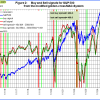 The MAC-US model invested the US stock markets in first week of February 2023.
The MAC-US model invested the US stock markets in first week of February 2023.
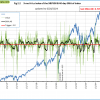 The 3-mo Hi-Lo Index Index of the S&P500 is at 3.70% (last week 3.40%) is exited the markets May 22, 2023.
The 3-mo Hi-Lo Index Index of the S&P500 is at 3.70% (last week 3.40%) is exited the markets May 22, 2023.
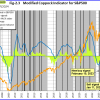 The Coppock indicator for the S&P500 exited the the US stock markets mid January 2024. This indicator is described here.
The Coppock indicator for the S&P500 exited the the US stock markets mid January 2024. This indicator is described here.
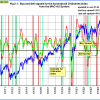 The MAC-AU model generated a buy signal end November 2023, and is invested from the Australian stock market.
The MAC-AU model generated a buy signal end November 2023, and is invested from the Australian stock market.
This model and its application is described in MAC-Australia: A Moving Average Crossover System for Superannuation Asset Allocations.
Recession:
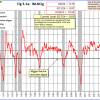 BCIg is not signaling a recession.
BCIg is not signaling a recession.
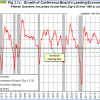 The growth of the Conference Board’s Leading Economic Indicator does not signal a recession.
The growth of the Conference Board’s Leading Economic Indicator does not signal a recession.
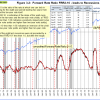 The Forward Rate Ratio between the 2-year and 10-year U.S. Treasury yields (FRR2-10) inverted beginning August 2022 and is signalling a recession — the average lead time of this signal is 14 months.
The Forward Rate Ratio between the 2-year and 10-year U.S. Treasury yields (FRR2-10) inverted beginning August 2022 and is signalling a recession — the average lead time of this signal is 14 months.
A description of this indicator can be found here.
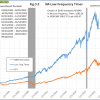 The iM-Low Frequency Timer switched to bonds on 9/26/2022.
The iM-Low Frequency Timer switched to bonds on 9/26/2022.
A description of this indicator can be found here.
